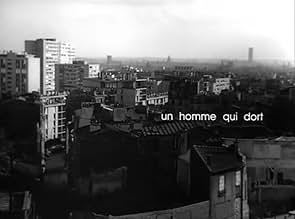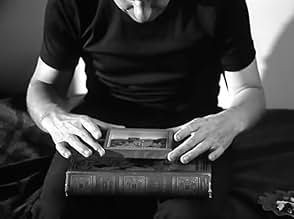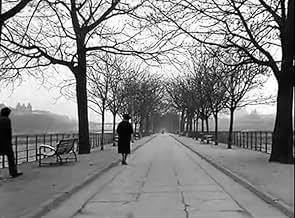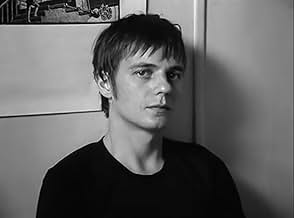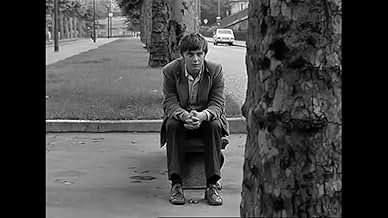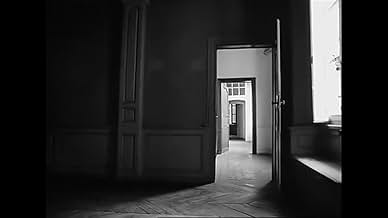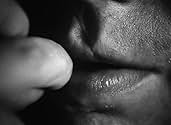Un homme qui dort
- 1974
- Tous publics
- 1h 17min
NOTE IMDb
7,9/10
5,2 k
MA NOTE
Ajouter une intrigue dans votre langueA 25-year-old male student in Paris becomes indifferent to the world around him, and subsequently feels a strong sense of alienation and hopelessness.A 25-year-old male student in Paris becomes indifferent to the world around him, and subsequently feels a strong sense of alienation and hopelessness.A 25-year-old male student in Paris becomes indifferent to the world around him, and subsequently feels a strong sense of alienation and hopelessness.
- Réalisation
- Scénario
- Casting principal
- Récompenses
- 1 victoire au total
Avis à la une
Quite a task making it through. But the ripples and ebbs and flows are well structured. Life can be tedious but this pushes it to the walls. It is a well done experimental film that focuses on a young college student who lives in a claustrophobic little room and does the same things, day after day. A rather monotoned female narrator drones on, although, when things are at their worst, she ups the emotion .Existential French cinema that was entirely new to me.
Perhaps cinema's final word on loneliness, aimlessness, and withdrawal, strikingly filmed in black and white. You may love it or hate it, but you probably have never seen anything like it (or Paris like this) before. *** out of 4.
This criminally underrated 1974 film easily ranks among the likes of "Pickpocket", "Breathless" and "The 400 Blows" as among the greatest films in french cinema. This film chronicles a young man who has dropped from his studies and is trying to distance himself from the world around, but starts finding it increasingly hard.
Shot in black and white, the film feels like a new wave film with it's raw, low budget cinematography, having a grainy and gritty look that punctuates the intense, somber mood of the film. Scenes in darkened areas are reminiscent of noir films in their use of shadow, and the editing is generally quick, sometimes with a musical flow. In addition to the imagery, the story is conveyed through a second person female narrator (second person meaning the narrator is always referring to "you", such as "you do or don't get up"). Interestingly, whenever the situation becomes more anxious and desperate, the narrator's normally flat tone starts to become more panicked, or angry. So while the film may seem initially as just a woman talking about something this man is doing, in reality it does have a, albeit abstract, character arc.
Although at times trying on the patience, this film's style ultimately pays off, creating a completely unique and engrossing experience. The slow, subtle deteoration of the main character's mental state spills into your mind. I was rarely bored while watching, thanks to the powerful imagery and raw, minimalist atmosphere. The detachment our lead is trying to create is perfectly conveyed. The film recreates the tedium and a sort of numb pain, the depravity, desperation and entrapment this attempted lifestyle leads to.
If you want a more traditional narrative, certainly look elsewhere. If what you've read here and in other reviews sounds interesting, than this is probably the film for you.
Shot in black and white, the film feels like a new wave film with it's raw, low budget cinematography, having a grainy and gritty look that punctuates the intense, somber mood of the film. Scenes in darkened areas are reminiscent of noir films in their use of shadow, and the editing is generally quick, sometimes with a musical flow. In addition to the imagery, the story is conveyed through a second person female narrator (second person meaning the narrator is always referring to "you", such as "you do or don't get up"). Interestingly, whenever the situation becomes more anxious and desperate, the narrator's normally flat tone starts to become more panicked, or angry. So while the film may seem initially as just a woman talking about something this man is doing, in reality it does have a, albeit abstract, character arc.
Although at times trying on the patience, this film's style ultimately pays off, creating a completely unique and engrossing experience. The slow, subtle deteoration of the main character's mental state spills into your mind. I was rarely bored while watching, thanks to the powerful imagery and raw, minimalist atmosphere. The detachment our lead is trying to create is perfectly conveyed. The film recreates the tedium and a sort of numb pain, the depravity, desperation and entrapment this attempted lifestyle leads to.
If you want a more traditional narrative, certainly look elsewhere. If what you've read here and in other reviews sounds interesting, than this is probably the film for you.
Can anyone imagine a film with a young student,his room and some pigeons ? This is a film which is going to take your breath away. Of course, it cannot be termed as boring. "Un homme qui dort" is surely not for people who guzzle endless quantities of coke, munch umpteen packets of popcorn while watching what they prefer to call "movies". For me personally it was an rewarding visual experience as there are various breath taking images in this film. The black and white photography dates back to 1974 when this film was made. It is true that during those times color films were made. But this film was filmed in black and white in order to heighten the atmosphere related to monotony,dullness. Yeah, for those who have studied French language and literature: This film is based on a book written by Georges Perec. He even collaborated on this film's scenario. A good news for all those who hunt for rare, hard to find videos. This film is available in France with English subtitles.
Famous French writer Georges Pérec was always interested in cinema. He notably took part in Alain Corneau's thriller "Série Noire" (1979) five years after this adaptation of his own novel. Shot by Bernard Quesyanne and awarded with the Jean Vigo prize, the filmmaker found an adequate cinematographic language to capture the somewhat desolate spirit of the novel.
A student who's about to end his studies decides overnight to stay completely indifferent to the world that surrounds him. It's a silent, black & white movie only enhanced by a woman voice over which introduces the young hero to the audience and comments from his own standpoint his actions. Although we don't know the reasons of his retirement from the world, we learn many things of his lifestyle: his bedroom, his wage, his eating habits, his wandering all over Paris etc... It's interesting to note down the mellow voice-over of the woman that gradually gets worried and angered. Indeed, our student is at first completely silent and indifferent but then anxiety, fear overcome here. Is it really possible to stay indifferent like that during a lifetime? Is there a possible exit?
This film could be a cousin of Alain Jessua's debut film "La Vie A L'Envers" (1964) in which a man stops to comply to the routine of everyday life. Such is also the case here. Only the voice-over enables the audience to penetrate the empty soul of this young man and to try to decipher his thoughts although as I previously said his motivations to refrain from social life remain blurred. Through him, Pérec wanted to express his view on French society but in a neutral way. He was always interested in it and showcased it in several of his books especially "La Vie: Mode D'Emploi" (1978). Given the anguished tone adopted by the voice in the second half of the film, the writer probably feels fear towards the banality and the mundane character of everyday life that offers no exits. Perhaps that's what our main hero tries to do: to stay in silence to try to discover another world. But it is bound to fail. So what to do?
Jacques Spiesser is perfectly directed and his expressionless faces capture the nothingness he voluntarily creates all around him. He is at the center of an arty film which tries and succeed to depict the humdrum common life that can verge towards absurdity.
A student who's about to end his studies decides overnight to stay completely indifferent to the world that surrounds him. It's a silent, black & white movie only enhanced by a woman voice over which introduces the young hero to the audience and comments from his own standpoint his actions. Although we don't know the reasons of his retirement from the world, we learn many things of his lifestyle: his bedroom, his wage, his eating habits, his wandering all over Paris etc... It's interesting to note down the mellow voice-over of the woman that gradually gets worried and angered. Indeed, our student is at first completely silent and indifferent but then anxiety, fear overcome here. Is it really possible to stay indifferent like that during a lifetime? Is there a possible exit?
This film could be a cousin of Alain Jessua's debut film "La Vie A L'Envers" (1964) in which a man stops to comply to the routine of everyday life. Such is also the case here. Only the voice-over enables the audience to penetrate the empty soul of this young man and to try to decipher his thoughts although as I previously said his motivations to refrain from social life remain blurred. Through him, Pérec wanted to express his view on French society but in a neutral way. He was always interested in it and showcased it in several of his books especially "La Vie: Mode D'Emploi" (1978). Given the anguished tone adopted by the voice in the second half of the film, the writer probably feels fear towards the banality and the mundane character of everyday life that offers no exits. Perhaps that's what our main hero tries to do: to stay in silence to try to discover another world. But it is bound to fail. So what to do?
Jacques Spiesser is perfectly directed and his expressionless faces capture the nothingness he voluntarily creates all around him. He is at the center of an arty film which tries and succeed to depict the humdrum common life that can verge towards absurdity.
Le saviez-vous
- AnecdotesThe film has several paintings by René Magritte: "La reproduction interdite" (1937), over Man's bed is the most prominent. The surreal cinematography also references "Pilgrim" (1966) and possibly other works of his as well. Also featured over the bed is "Relativity" by M.C. Escher.
Meilleurs choix
Connectez-vous pour évaluer et suivre la liste de favoris afin de recevoir des recommandations personnalisées
- How long is The Man Who Sleeps?Alimenté par Alexa
Détails
- Durée1 heure 17 minutes
- Couleur
- Mixage
- Rapport de forme
- 1.37 : 1
Contribuer à cette page
Suggérer une modification ou ajouter du contenu manquant

